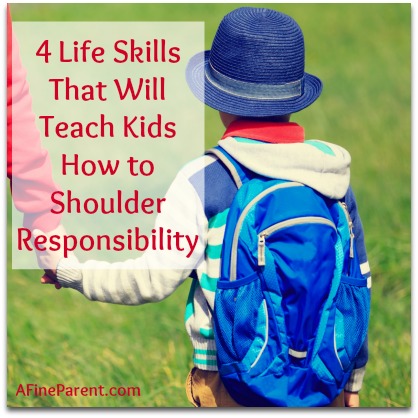 Here I am. Folding laundry. The ball and chain of chores.
Here I am. Folding laundry. The ball and chain of chores.
I thought it was bad when they were babies and they had multiple outfit changes. I buoyed my spirits by telling myself that when they were older and didn’t spit up so much and were neater eaters things would be better.
Well, let me tell you, people. It’s not better.
They are 12 and 9 now and it still never ends. I do some laundry and then there is always more that appears! Some random white t-shirt when I’d just done all the whites shows up in the basket, mocking me.
And most of it is theirs! Their pants! Their shirts! Their socks and underwear! Without me they’d never leave the house in clean clothes.
OMG. Without me they’d never leave the house in clean clothes!!
What about when they go to college? Who’s going to do their laundry?
What about when they get married? Am I setting some poor person up for a lifetime of no help with laundry duty?
Holy cow, I am!
I had to wonder what other responsibilities I hadn’t taught them about yet, either because they were “too young” or because it was faster to do it myself.
Then I wondered when I was actually going to find the time to teach them things like laundry, cooking, and washing the dishes. And what about bigger responsibilities like managing money? When was I going to get around to that?
This little epiphany hit me in the middle of folding towels. I looked down at them and realized I needed to start immediately. And I could start with towels.
That was my first step on the path to really, thoughtfully teaching my kids the life skills that lead to learning responsibility. The next step was to decide what to teach them next.
Personal Responsibility
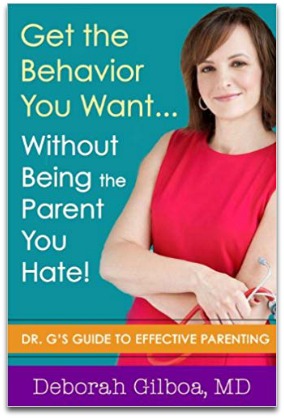 To find out where to begin, Dr. Deborah Gilboa, a parenting and youth expert and author of Get the Behavior You Want…Without Being the Parent You Hate!, recommends we ask ourselves, “Am I teaching you what you need to know?” Everything we teach them boils down to 3 life skills. Does it teach them Respect? Does it teach them Responsibility? Does it teach them Resilience?
To find out where to begin, Dr. Deborah Gilboa, a parenting and youth expert and author of Get the Behavior You Want…Without Being the Parent You Hate!, recommends we ask ourselves, “Am I teaching you what you need to know?” Everything we teach them boils down to 3 life skills. Does it teach them Respect? Does it teach them Responsibility? Does it teach them Resilience?
When I talk about personal responsibility I use Dr. Gilboa’s definition that taking personal responsibility is having the ability to notice something that is your obligation and doing your best to succeed at that obligation. Personal responsibility is the care we owe to ourselves, to our family, and to our community.
It’s like noticing that there is a napkin on the floor and realizing that you should, as a member of the household, pick up the napkin off the floor and put it where it goes. Even though you aren’t the one who dropped it.
Teaching responsibility starts with small things like having your toddler put their shoes in the shoe basket by the front door or having your preschooler pick out their own weather-appropriate clothes.
One simple area you start finding places to teach them personal responsibility is in the kitchen. Having children make their own breakfast and snacks not only teaches them responsibility, but it can also help stop picky eating in its tracks.
Washing the lettuce and spinning it dry, setting the table, and separating the clumps of broccoli lets kids interact with food and gives them a responsibility that contributes to the household in a real and meaningful way.
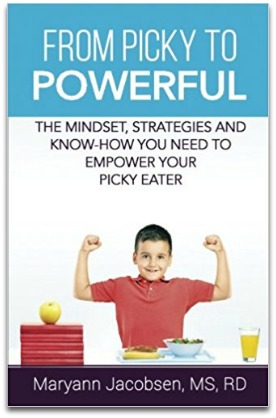 I also needed to get out of the way of their breakfasts and snacks. Kids as young as 2-years-old at the preschool I work at can pour milk into their cereal bowl using a small pitcher and they use a small scoop to put their cheese crackers onto their plates! They are choosing which foods to try and how much to eat, which, according to Maryann Jacobsen, a nutrition expert and author of From Picky to Powerful: The Mindset, Strategies and Know-How You Need to Empower Your Picky Eater, is their responsibility.
I also needed to get out of the way of their breakfasts and snacks. Kids as young as 2-years-old at the preschool I work at can pour milk into their cereal bowl using a small pitcher and they use a small scoop to put their cheese crackers onto their plates! They are choosing which foods to try and how much to eat, which, according to Maryann Jacobsen, a nutrition expert and author of From Picky to Powerful: The Mindset, Strategies and Know-How You Need to Empower Your Picky Eater, is their responsibility.
She has based this on Ellyn Satter’s Division of Responsibilities model. The parent’s job is to decide where and when and what foods are served. The kid’s job – their responsibility in nourishing their bodies – is to decide which foods to eat and how much they need to eat. Eating is such a basic human need we don’t even think about how filling our bodies with healthy foods is a responsibility we owe to ourselves.
Giving them the tasks of choosing which foods to eat from the menu we provide, helping to provide that food, and then learning how to cook it teaches our kids lessons about personal responsibility to themselves, the family, and the great community.
(Bonus! It also makes having dinner together fun again by eliminating power struggles at the dinner table.)
Delegating Household Chores
When I think about my adult life I am astonished at just how many things I need to know how to do. Cooking for myself, cleaning the house, and, of course, doing laundry. These are just the tip of the iceberg.
And this is a good place to start.
Dr. Gilboa also recommends considering the maturity of your child and what tasks they can take up that will take something off your plate. Things like making their own breakfast and snacks, or doing their own laundry, are simple tasks, but very important tasks that children can do.
I started with laundry because that was definitely something I wanted off my plate. Towels are a great first laundry item. They let children have a good chance at succeeding at something considered an adult job. And if my boys don’t succeed their first time out it is easy for me to coach them to success because I find it relatively uncomplicated to explain.
Once they had got the hang of towels I had them each be responsible for their own dirty clothes. I started out by reminding them about doing laundry. “Do you have pants in your drawer? How about socks and underwear?” Asking these questions made them aware of the cues that should trigger a laundry response.
Basically, if you are taking the last pair of pants out of your drawer then you should be thinking, “Gee! I guess I need to do laundry!”
After a while I upped the responsibility ante on them. I no longer reminded them about doing laundry. It is a risk, but it shows them I respect their ability and judgment. It gives them a challenge to rise to.
Have they ever forgotten to do their laundry? Yes. Have they ever come to me upset they have no socks in their drawer? Definitely. But if they forget then they have to wear their cleanest dirty socks. It’s not going to kill them, but they do find it an unpleasant enough experience that we haven’t had very many laundry crises.
This kind of shouldering of personal responsibility isn’t just teaching a life skill. It is also a very real contribution to the family. They are taking personal responsibility for what would be for me a household chore.
Having my kids do household chores does more than just takes tasks off my plate. Depending on the chore you choose to teach your children, you can be helping them learn skills and grow in other areas.
Handling Money
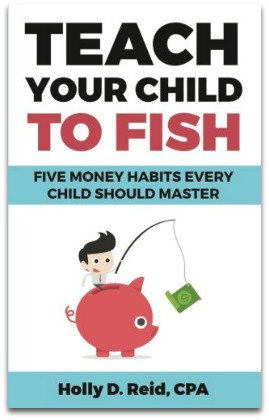 One responsibility they will absolutely have as adults is handling money. Everyone needs to know how to handle money wisely. Holly D. Reid, a CPA and author of Teach Your Child To Fish: Five Money Habits Every Child Should Master, says one of the keys to handling money with respect is to teach your child that it is the reward for hard work.
One responsibility they will absolutely have as adults is handling money. Everyone needs to know how to handle money wisely. Holly D. Reid, a CPA and author of Teach Your Child To Fish: Five Money Habits Every Child Should Master, says one of the keys to handling money with respect is to teach your child that it is the reward for hard work.
But she isn’t saying your 10-year-old should run out and get a job today! Children’s first jobs come in the household. Specifically there are three jobs for every child. The first is to be a good student. The second is to be a contributing member of the family. The third is to be entrepreneurial.
But don’t worry or feel daunted! Teaching your kids how to be responsible about money can be tons of fun!
You can build in an allowance or a pay-for-chores system – whatever fits your lifestyle. The fun part comes when they have a goal or a dream they want to accomplish.
Next year my older son has a chance to go to Europe for a school trip. Now, this school trip is quite expensive and it’s a huge privilege. We are having him total the cost of the trip and figure in his spending money and lunch costs. Then we are going to offer to pay for half the trip.
Since the trip is a year away it gives him plenty of time to figure out how he’s going to pay for it. Since he wants it badly enough he will come up with creative ideas and he will have the drive necessary to make the finances work.
This not only relieves his Dad and I of part of the financial burden and teaches him about sacrificing for a larger dream, but it also helps break any kind of entitlement cycle that might be starting up. Which is a huge relief!
You don’t have to have something huge like a trip to teach your children about goals and budgeting. It can be something small like a new toy or a present for Father’s or Mother’s Day.
Being able to make choices about what they spend their money on as kids is a huge step towards shouldering massive responsibilities as an adult.
Finding Their Own Solutions
Another big steppingstone towards becoming a responsible adult is to have them solve their own problems.
Conflict resolution is an art that not all of us master. I certainly haven’t! But I have done a lot of work to learn how to solve problems with no (or minimal) shouting.
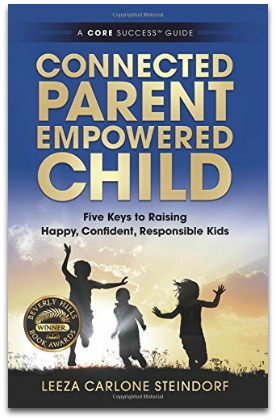 Leeza Steindorf, founder and director of Core Success and author of Connected Parent Empowered Child, reminds us that tension is going to exist in any situation. She also reminds me that two people in conflict are really just two people with differing ideas.
Leeza Steindorf, founder and director of Core Success and author of Connected Parent Empowered Child, reminds us that tension is going to exist in any situation. She also reminds me that two people in conflict are really just two people with differing ideas.
That really flipped my perception on conflict! Once I could look beyond the emotions of an argument my sons were having I could more clearly see what was really going on.
She also recommends going into an argument with a sense of curiosity and to “know that you do not know” what you are going to hear when you ask, “What happened?” Just the act of feeling heard can diffuse the anger and frustration boiling over from the other person.
Really listening and shedding preconceived idea of their responses can open my eyes to a completely different universe!
And it is easy to teach to your kids!
I started out on the tram. “See that person over there? Where do you think they are going?” Then we would go through all the possibilities of where that person could be going.
She’s wearing a nice dress so she could be going to the opera.
It’s daytime so she could be going to a wedding.
She might be an actress.
The dress is dark so she might be going to a funeral.
Going from joyful assumptions to something really sad illustrates to our kids that we don’t really know what that person might be doing or thinking or what kind of day they might be having. It teaches my kids to keep an open mind about the people they see around them.
This then translates into giving people they are having an argument with the benefit of the doubt that they are acting from a place of goodness. Carl Rogers called this Unconditional Positive Regard.
It is a gift to be able to teach this to our young children and will shape how they work through tense times with those around them. It will prepare them for the responsibility to work out problems peacefully and to bring harmony to family life.
2-Minute Action Plan for Fine Parents
For our contemplation question today, let’s start by asking ourselves Dr. Gilboa’s question – “Am I teaching my child what they need to know?”
If the answer is ‘no’ or ‘sort of’ jot down 5 things that they need to know given their age and maturity level. Pick one of these things to teach them this week. Plan how you and your partner will teach it to them and how you can both support them through the learning process.
Long Term Action Plan for Fine Parents
Each week pick another item from your list of things they need to know and start teaching to them.
As they become more comfortable with their responsibilities give them the independence, with accountability, to carry out these tasks. As they grow you will be able to determine when they are ready for more complex responsibilities and they will be ready for the world!
Hello
I am 40 years old and i have kids. A couple of months i am thinking the same thing but how can i do? Suddenly i am reaching your post and i got lot of information through this post. Fantastic i should follow.
Life becomes more busy with children, which makes it difficult to manage household chores. Your plane is better than my plane. I download your photo and I’ll follow this schedule for a week.birthday photoshoot
Not true Bob, when my wife and I visited a couple of years back one thing that amazed us was the quality of the food in nearly every place we went to was fantastic. In the uk you’d be lucky if you had a good meal you really enjoyed in 1 out of 10.paint by numbers for adults
I am 40 years old and i have kids. A couple of months i am thinking the same thing but how can i do? Suddenly i am reaching your post and i got lot of information through this post. Fantastic i should follow.
I am so glad you are finding it helpful, Lana. Teaching children about responsibility is a long road, but extremely rewarding.
For what its worth, I agree with you about outreach. I think we probably agree on service in a public context, and diverge a bit at the moment on service /within/ the profession.pc-hjelp
Lucky you to have the opportunity to have pecans that close and that fresh! They’re up there with one of my faves! This cake looks super good, David. I’ve been itching to bake a cake lately (hubby and I have been watching The Great British Baking Show and that always inspires me). The cake looks so fluffy and love all the pecans on top 🙂roofers
The speech device is so cool!! Praying that Hudson will love it and be able to get one of his own. It sounds like he is warming up to it, so very promising! Your home is just beautiful and I won’t be surprised to hear it sells quickly. We are not shoveling snow down here, for which I am very thankful. Maybe that’s why I live in the south. 😉Agen Sakong
Hello, I am so pleased that you enjoyed the article. The books that I cite in the article are really amazing. I highly recommend you buy them or find them in your library.general store
I love the idea of everyone getting involved in the planning — I so need to do that! And the Bob Evans mashed potatoes are crazy good! They are a staple at our house, but I haven’t tried the mac and cheese yet, but I will! Great tips!
Great advice about handling money. My son went to Europe at the end of his senior year. We had over a year to plan for it. Like you, I agreed to pay half the cost of the trip. This gave him the opportunity to calculate the cost, get a job, set up a checking about and save money and make the payments.
When he returned home, he could tell the difference between the students who paid for part of the it and those whose parents paid for everything. He said the later group continually complained they didn’t have cell phone coverage, they didn’t like the food, etc, but the others put their cell phones away except to take pictures and enjoyed the museums, the food, the people–the experience.
That is really fascinating. You should consider writing your own article.
Great post Mindy! I think I should apply your tips for my an 5-year-old son from now on. I hope he growing to be a person who has a high sense of responsibility in the life.
I am so pleased that you enjoyed the article. The books that I cite in the article are really amazing. I highly recommend you buy them or find them in your library.
You really blew me away with this article this morning… Thank you for sharing such a valuable insight. So often we treat parenting as a day-to-day task-to-task job with a vague eye toward building skills like playing the piano or becoming a kind person. You’ve opened my eyes to remembering that we’re also building adults who share responsibilities with their future roommates, families and coworkers. A very valuable lesson, and a great one to keep in mind as we step into a new year!
You are so very kind! And I think that the more we focus on the long-term goal of raising responsible adults, the better choices we will make in the short-term.
Very timely and helpful for me, thanks.
Though not the main focus, the “open mind” work is just what we need to change our lives. We have long been stuck in an awful rut of frustration, resentment and recriminations, and I have been trying to focus on connection as a way of shifting our dynamics to a better place. I’ll check out the Steindorf book ASAP!
I am so glad that you found this helpful! You are going to love one of our speakers we are featuring at our 2019 conference! (Not allowed to say anything now, but keep on eye on the site. We’ll be announcing later this month.)